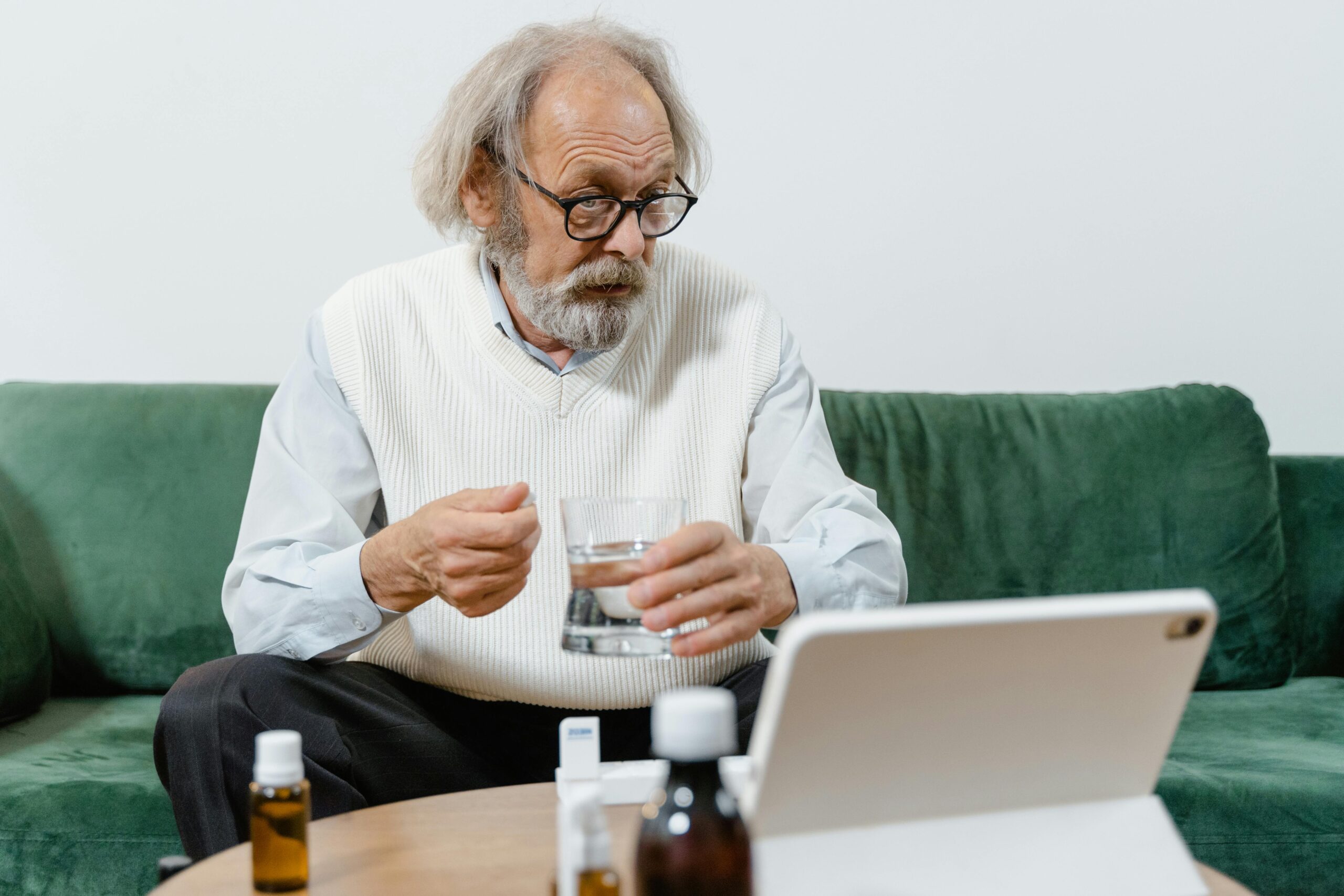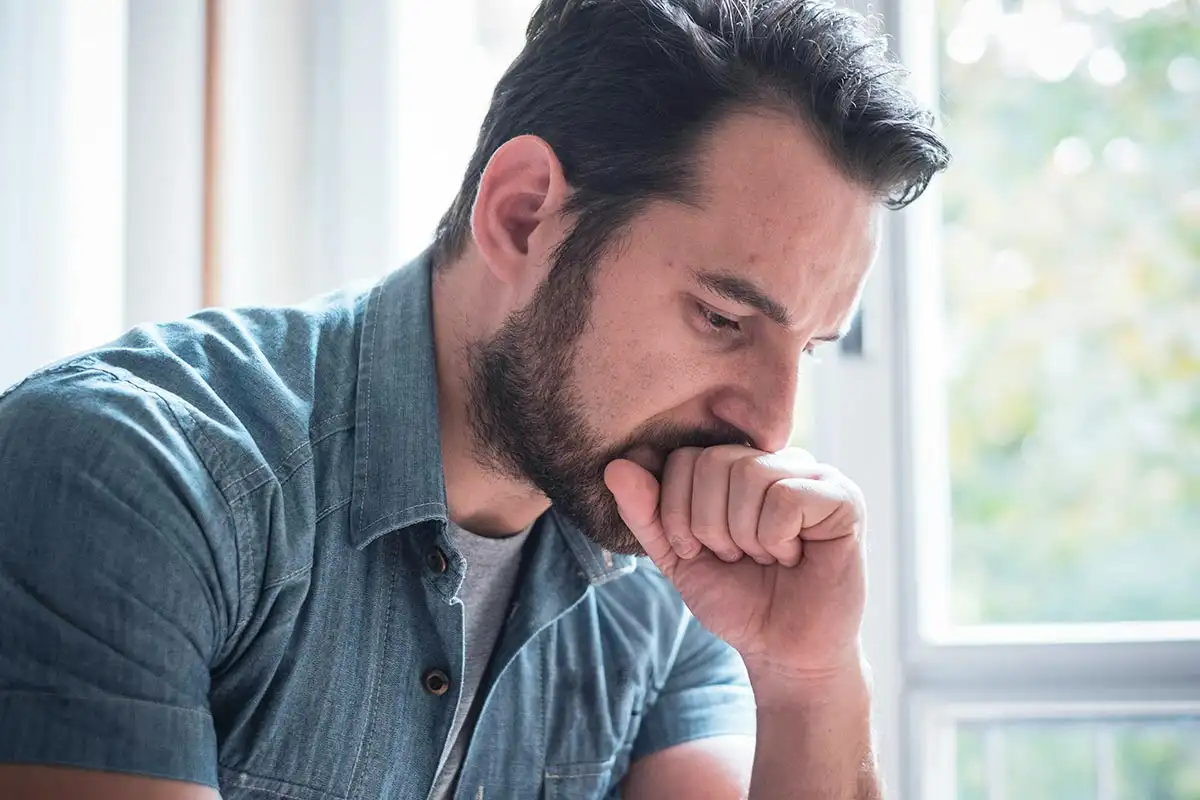
OCD Virtual IOPs: Specialized Online Treatment for Californians
Medically Reviewed by:

Dr. Marco M. Zahedi
Medical Director, Compassion Recovery Center

Dr. Michael Majeski
Licensed Psychologist (LP), Compassion Recovery Center
Table of Contents
Navigating OCD: How Virtual IOPs Offer Hope and Healing for Californians
Obsessive-Compulsive Disorder, or OCD, is more than just double-checking the stove or liking things neat. It’s a challenging mental health condition characterized by persistent, unwanted thoughts (obsessions) and repetitive behaviors or mental acts (compulsions) that an individual feels driven to perform. These aren’t quirks; they are intrusive experiences that can cause significant distress, consume hours of a person’s day, and interfere deeply with daily life, relationships, work, and overall well-being. If you or someone you love is grappling with OCD, you understand how isolating and exhausting it can be. The constant battle against your own mind can feel relentless, leaving you searching for effective ways to regain control and find peace.
Fortunately, specialized treatment can make a profound difference. One powerful approach is an Intensive Outpatient Program (IOP). An Intensive Outpatient Program (IOP) provides a structured and supportive therapeutic environment without requiring an overnight stay, making it a more flexible option than residential treatment. IOPs are particularly relevant for OCD treatment because they offer consistent, focused therapy, which is crucial for managing its complex symptoms. Traditionally, attending an IOP meant traveling to a physical location several times a week. However, the rise of telehealth has brought about a transformative solution: the Virtual IOP Program. This innovative approach delivers the same high-quality care directly to you, wherever you are, through secure online platforms.
For Californians, from the bustling cities of Southern California like those in Orange County to the quieter, more remote areas of the state, virtual IOPs offer unprecedented access to specialized OCD treatment. The benefits are manifold: no commute times, greater privacy, the comfort of your own home, and the ability to integrate treatment more seamlessly into your daily life. At Compassion Recovery Center, we specialize in providing these remote IOP services, bringing expert care for OCD and co-occurring conditions directly to individuals across California. If you’re looking for effective, accessible, and compassionate mental health treatment, exploring an OCD Virtual IOP could be your first step towards a brighter future. We understand the unique struggles of OCD and are here to help you navigate the path to recovery. You don’t have to face this alone; reach out today to learn more about our programs.

Understanding OCD: Beyond the Myths
Obsessive-Compulsive Disorder (OCD) is often misunderstood, trivialized in popular culture as a penchant for cleanliness or order. However, for those who live with it, OCD is a serious and often debilitating condition that can profoundly impact every facet of life. It’s essential to look beyond these stereotypes to grasp the true nature of OCD and the significant challenges it presents. Understanding these challenges is the first step toward seeking and appreciating the value of specialized online treatment for OCD.
OCD is characterized by two core components: obsessions and compulsions.
- Obsessions: These are recurrent and persistent thoughts, urges, or images that are experienced as intrusive and unwanted, causing marked anxiety or distress. Common obsessions include fears of contamination by germs or dirt, worries about harming oneself or others, an intense need for things to be orderly or symmetrical, or intrusive thoughts of a religious, sexual, or violent nature. These are not simply worries about real-life problems; they are often irrational and inconsistent with a person’s values.
- Compulsions: These are repetitive behaviors (e.g., hand washing, ordering, checking) or mental acts (e.g., praying, counting, repeating words silently) that the individual feels driven to perform in response to an obsession or according to rules that must be applied rigidly. The goal of these compulsions is to prevent or reduce anxiety or distress, or to prevent some dreaded event or situation. However, these compulsions are not realistically connected to what they are designed to neutralize or prevent, or they are clearly excessive.
The challenges faced by individuals with OCD are numerous and significant. The cycle of obsessions and compulsions can be incredibly time-consuming, sometimes taking up several hours a day. This can lead to:
- Impaired Daily Functioning: Difficulty concentrating at work or school, challenges in maintaining relationships, and inability to complete everyday tasks.
- Emotional Distress: Constant anxiety, fear, guilt, shame, and even depression are common. The feeling of being “out of control” of one’s own mind can be deeply distressing.
- Social Isolation: Shame and the fear of being misunderstood can lead individuals to withdraw from social situations and hide their symptoms from loved ones.
- Physical Health Issues: For example, excessive hand washing can lead to skin problems, or stress can manifest in other physical ways.
- Co-occurring Conditions: OCD frequently co-occurs with other mental health conditions such as anxiety disorders, depression, and sometimes substance use disorders, as individuals may turn to alcohol or drugs to self-medicate their distress. This makes dual diagnosis treatment crucial for holistic recovery.
Given these complexities, the importance of specialized treatment for OCD cannot be overstated. General talk therapy or approaches that don’t specifically target OCD mechanisms are often ineffective. OCD requires targeted interventions, primarily Exposure and Response Prevention (ERP), a form of Cognitive Behavioral Therapy (CBT), which is considered the gold standard. This therapy helps individuals gradually confront their fears (exposure) without engaging in compulsive rituals (response prevention), thereby learning that their anxiety will decrease on its own and their feared outcomes often don’t materialize. Finding providers trained and experienced in these specific modalities is key. At Compassion Recovery Center, we understand these nuances and offer specialized online treatment for OCD designed to address these core symptoms effectively. If these challenges resonate with you, it’s important to know that effective help is available. You can start your free assessment with us to explore your options.
What is a Virtual IOP? A Modern Approach to Healing
As we delve deeper into solutions for OCD, it’s important to understand the treatment structures available. An Intensive Outpatient Program (IOP) is a robust level of care that provides more therapeutic contact than traditional weekly outpatient therapy but allows individuals to live at home and maintain many of their daily responsibilities. Now, imagine accessing this comprehensive support system from the comfort and privacy of your own home. That’s precisely what a Virtual Intensive Outpatient Program (Virtual IOP) offers. A Virtual IOP, sometimes referred to as a remote IOP, is a structured treatment program delivered online using secure telehealth technologies.
The structure of a Virtual IOP typically mirrors that of an in-person program. Participants engage in several hours of therapeutic activities per day, usually three to five days a week. These activities generally include:
- Individual Therapy: One-on-one sessions with a therapist trained in OCD-specific treatments like ERP and CBT. This allows for personalized attention and focused work on individual challenges.
- Group Therapy: Sessions with a small group of peers, often facilitated by one or more therapists. Group therapy provides a supportive environment where individuals can share experiences, learn from others, reduce feelings of isolation, and practice social skills related to managing OCD.
- Psychoeducation: Learning about OCD, its mechanisms, treatment strategies, coping skills, and relapse prevention. Understanding the disorder is a key component of managing it effectively.
- Skills Training: Practical workshops focused on developing specific skills, such as stress management, mindfulness, emotional regulation, and, crucially for OCD, how to implement ERP techniques. More details can be found in our IOP schedule guide.
- Family Therapy/Support (if applicable): Involving loved ones in the treatment process can be highly beneficial, helping them understand OCD and learn how to best support the individual in recovery. Compassion Recovery Center also offers virtual couples counseling rehab which can be a vital support.
The primary difference between traditional and virtual IOPs lies in the delivery method. Traditional IOPs require patients to commute to a physical clinic or treatment center. This can present significant barriers, such as travel time and costs, scheduling conflicts, and for some, the anxiety of attending a new, unfamiliar place. Virtual IOPs eliminate these barriers. By utilizing secure video conferencing, online portals for resources, and digital communication tools, treatment is brought directly to the individual. This model of telehealth addiction treatment (and mental health treatment) has rapidly gained recognition for its effectiveness and convenience.
For OCD patients, the benefits of a virtual IOP can be particularly compelling:
- Comfort and Familiarity: Receiving therapy in one’s own home environment can reduce anxiety and make it easier to engage in treatment, especially when starting ERP, which involves confronting feared situations often present in the home.
- Reduced Stigma: The privacy of online treatment can make it easier for individuals to seek help without fear of judgment or disclosure.
- Enhanced Flexibility: Virtual programs often offer more flexible scheduling options, making it easier to balance treatment with work, school, or family responsibilities. This is a significant advantage for busy professionals and parents, as detailed in how virtual IOP fits into a busy schedule.
- Accessibility to Specialists: Regardless of your geographical location within California, a virtual IOP connects you with therapists specialized in OCD, which might not be available locally.
- Real-World Application: Practicing ERP exercises in the actual environment where obsessions and compulsions occur can make the therapy more effective and its benefits more transferable to daily life.
Compassion Recovery Center’s Virtual IOP Program is designed to leverage these benefits, providing high-quality, evidence-based care for OCD in a supportive and accessible online format. If you’re considering an IOP, exploring a virtual option could open up new possibilities for healing and recovery. We encourage you to check insurance coverage for our programs, as many plans do cover this level of care.

Specialized Online Treatment for OCD: Evidence-Based Care at Your Fingertips
Treating Obsessive-Compulsive Disorder effectively requires more than just general counseling; it demands specialized approaches that target the core mechanisms of the disorder. Fortunately, highly effective, evidence-based therapies for OCD can be delivered successfully through a virtual format, making specialized online treatment for OCD a reality for many Californians.
The cornerstones of effective OCD treatment, readily available in reputable virtual IOPs, include:
- Cognitive Behavioral Therapy (CBT): CBT is a type of psychotherapy that helps individuals identify, challenge, and change unhelpful thought patterns and behaviors. For OCD, online CBT therapy focuses on understanding the relationship between obsessions, anxiety, and compulsions. It helps individuals recognize that their obsessive thoughts are just thoughts, not necessarily facts or predictions of the future, and that engaging in compulsions only temporarily relieves anxiety while strengthening the OCD cycle in the long run. Learning to restructure these cognitive distortions is a vital part of recovery. You can learn more about such approaches in our guide to evidence-based therapies.
- Exposure and Response Prevention (ERP): ERP is considered the gold-standard treatment for OCD and is a specific type of CBT. It involves two main components:
- Exposure: Gradually and systematically confronting the thoughts, images, objects, and situations that trigger obsessions and anxiety. This is done in a controlled and supportive manner, starting with less distressing triggers and moving towards more challenging ones.
- Response Prevention: Actively resisting the urge to perform compulsive behaviors or mental rituals once the anxiety or obsessions have been triggered. By not engaging in the compulsion, individuals learn that their anxiety will naturally decrease over time (habituation) and that their feared consequences often do not occur.
Delivering ERP virtually can be uniquely effective. Therapists can guide patients through exposure exercises in their actual home environment, where many triggers exist. For instance, someone with contamination fears might be guided to touch a “contaminated” object in their home and then resist washing their hands, all while on a secure video call with their therapist providing real-time support and coaching. This direct application in the patient’s environment can enhance the generalizability of treatment gains.
The role of telehealth addiction treatment and mental health care in providing accessible treatment cannot be overstated. Telehealth platforms bridge geographical gaps, connecting individuals in remote or underserved areas of California with specialized OCD therapists who might otherwise be out of reach. This enhanced accessibility is crucial, as timely access to appropriate care significantly improves outcomes. As highlighted in our article on accessibility in recovery, virtual treatment is breaking down long-standing barriers to care.
Virtual IOPs cater to the specific needs of OCD patients by:
- Providing a Structured and Intensive Approach: The regular, multi-hour sessions of an IOP ensure consistent engagement with ERP and CBT principles, which is necessary for breaking the OCD cycle.
- Offering Individualized Treatment Plans: Therapists work with each patient to create a personalized hierarchy of exposures and tailor interventions to their specific obsessions and compulsions.
- Facilitating Peer Support: Group therapy in a virtual IOP allows individuals with OCD to connect with others who truly understand their experiences, reducing feelings of shame and isolation. Sharing successes and challenges with ERP can be incredibly validating and motivating.
- Incorporating Family Involvement: OCD often impacts families. Virtual platforms make it easier to include family members in therapy sessions to educate them about OCD and how they can support their loved one constructively, rather than inadvertently enabling compulsions.
- Addressing Co-occurring Conditions: Many individuals with OCD also experience anxiety, depression, or substance use issues. A comprehensive virtual IOP, like those at Compassion Recovery Center, will offer dual diagnosis treatment to address all co-occurring conditions concurrently. This may include access to drug rehab programs or alcohol rehab programs components within the telehealth framework.
At Compassion Recovery Center, our commitment is to provide this specialized, evidence-based care through our accessible OCD Virtual IOP. We believe that everyone deserves access to the best possible treatment, regardless of their location. If you’re ready to explore how specialized online therapy can help you manage OCD, we invite you to contact us for a confidential assessment.
The Perks of Going Virtual: Benefits of OCD IOPs for Californians
California is a vast and diverse state, with lifestyles ranging from the fast-paced urban environments of Los Angeles and Orange County to the more laid-back or remote rural communities. For Californians seeking specialized treatment for Obsessive-Compulsive Disorder, a virtual rehab California program, specifically an OCD Virtual IOP, offers a wealth of benefits tailored to the unique needs and challenges of living in the Golden State.
One of the most significant advantages is accessibility and convenience. Regardless of whether you live in a major metropolitan hub with abundant (though often difficult to access due to traffic) treatment options, or in a more geographically isolated area where specialized OCD therapists are scarce, a virtual IOP brings expert care directly to your doorstep. All you need is a stable internet connection and a private space. This means individuals in underserved communities or those with mobility issues can access the same high-quality treatment as someone living next door to a renowned clinic. This levels the playing field, ensuring that your location within California doesn’t dictate your access to essential mental health treatment.
Virtual IOPs effectively help in overcoming geographical barriers and logistical hurdles. California is notorious for its traffic, and commuting to a treatment center multiple times a week can be a significant source of stress, time consumption, and expense. Imagine the hours spent battling freeway congestion, the cost of gas, and potentially parking fees – all eliminated with a virtual program. For parents, arranging childcare to attend in-person sessions can be another major obstacle. A remote IOP allows for greater integration of treatment into your existing life, rather than life revolving around treatment logistics.
The flexibility in scheduling and reduced travel time offered by virtual IOPs is a game-changer for many busy Californians. Whether you’re a working professional, a student, or a caregiver, the ability to attend therapy sessions from home saves valuable time that can be redirected to work, family, or self-care. Many virtual programs, including those at Compassion Recovery Center, offer session times that can accommodate various schedules, making it more feasible to commit to an intensive level of care without completely upending your life. This adaptability is discussed further in our blog about scheduling rehab around work and life.
Further benefits particularly relevant to Californians include:
- Cost Savings: Beyond just gas and parking, there are no travel-related meal expenses or the potential need to take excessive time off work that might be unpaid. These savings can make treatment more financially accessible.
- Comfort and Privacy: Receiving therapy in the familiar and secure environment of your own home can reduce the anxiety associated with seeking treatment. This is especially beneficial for individuals with OCD who may have specific sensitivities or anxieties related to new or public environments. The privacy of telehealth can also help mitigate any perceived stigma.
- Real-World Application of Skills: As mentioned earlier, practicing ERP and other coping skills in your actual living environment makes the therapy more relevant and helps to generalize treatment gains to everyday life situations where OCD symptoms are most likely to occur.
- Reduced Exposure to Illnesses: In an era where health consciousness is high, avoiding communal waiting rooms and group settings can be an added comfort and practical benefit for many individuals.
- Continuity of Care: If you need to travel within California or even relocate, a virtual IOP can often continue uninterrupted, providing stable and consistent support.
For residents of Orange County and across California, Compassion Recovery Center is dedicated to providing these accessible and effective OCD Virtual IOPs. We understand the diverse needs of Californians and have tailored our programs to offer maximum benefit and convenience. If you’re ready to experience the advantages of specialized online OCD treatment, we encourage you to explore treatment options with us. Taking this step can bring profound relief and help you reclaim your life from OCD.
Compassion Recovery Center’s Approach: Personalized Telehealth for OCD and Beyond
At Compassion Recovery Center, we are more than just a treatment provider; we are a dedicated team of professionals passionate about helping individuals in California find lasting recovery from Obsessive-Compulsive Disorder and related conditions. Our core mission is to deliver high-quality, evidence-based care through accessible and innovative telehealth solutions, ensuring that everyone has the opportunity to heal, regardless of their location or life circumstances. We specialize in remote drug rehab in Orange County and statewide mental health services, with a strong focus on individualized treatment plans.
Our comprehensive suite of services, delivered primarily via telehealth, is designed to meet a wide range of needs:
- Virtual IOP Program for OCD: This is our flagship program for individuals needing intensive support for OCD. It incorporates evidence-based therapies like ERP and CBT, delivered through a structured schedule of individual and group sessions.
- Online CBT Therapy: We offer specialized Cognitive Behavioral Therapy tailored to address the thought patterns and behaviors associated with OCD, anxiety, depression, and other mental health concerns.
- Dual Diagnosis Treatment: OCD often co-occurs with other mental health conditions or substance use disorders. Our integrated approach addresses these complex needs concurrently, recognizing that treating only one aspect is often insufficient. We provide support for those who may also need drug rehab programs or alcohol rehab programs within our telehealth framework.
- MAT Treatment Online: For individuals with co-occurring opioid or alcohol use disorders, Medication-Assisted Treatment (MAT) can be a crucial component of recovery. We facilitate access to MAT services online, integrating medication management with therapy to support long-term sobriety and stability.
- Virtual Couples Counseling Rehab: OCD and addiction can strain relationships. Our virtual couples counseling helps partners navigate these challenges, improve communication, and build a supportive home environment conducive to recovery.
- Outpatient Detox Support: For those who qualify, we can provide support and coordination for outpatient detoxification, often as a first step before engaging in an IOP for co-occurring substance use. More information on this can be found when you learn about telehealth in early recovery.
- Continuum of Care: While we specialize in IOP, we understand that individuals may need different levels of care. We can also discuss options like Partial Hospitalization Programs (PHP) if a higher level of virtual support is indicated, or help transition clients to less intensive outpatient services as they progress.
What truly sets Compassion Recovery Center apart is our emphasis on personalized care and our expertise in telehealth addiction treatment and mental health services. We recognize that each individual’s experience with OCD is unique. Therefore, we don’t believe in one-size-fits-all solutions. Our treatment plans are carefully tailored to meet the specific symptoms, triggers, co-occurring conditions, and personal goals of each client. From the initial free assessment, our team works collaboratively with you to develop a roadmap for recovery that feels right and is effective.
While every recovery journey is personal, we are proud of the positive outcomes our clients achieve. Individuals completing our programs often report a significant reduction in OCD symptoms, improved ability to manage anxiety, enhanced daily functioning, stronger relationships, and a renewed sense of hope and empowerment. They learn practical skills to navigate challenges, build resilience, and maintain their progress long-term. Our success is measured by the lives transformed and the individuals who rediscover joy and meaning free from the grip of OCD. We encourage you to read about the importance of celebrating milestones in recovery, a practice we champion.
If you are in California, especially in areas like Orange County, and seeking compassionate, expert, and convenient care for OCD or co-occurring conditions, Compassion Recovery Center is here for you. We invite you to get help now and learn more about how our specialized virtual programs can support your journey to wellness. Your path to a more fulfilling life starts with a simple conversation.
Integrating Technology in OCD Treatment: Secure, Effective, and Accessible Care
The successful delivery of specialized online treatment for OCD, particularly through a Virtual Intensive Outpatient Program (Virtual IOP), hinges on the effective and ethical integration of technology. At Compassion Recovery Center, we prioritize leveraging technology not just for convenience, but to enhance the quality, security, and efficacy of the care we provide to Californians. Understanding how technology is used can help alleviate concerns and build confidence in virtual treatment models.
A cornerstone of our OCD Virtual IOP is the use of secure video conferencing platforms. These are not your everyday consumer video chat applications. We utilize HIPAA-compliant platforms designed specifically for healthcare. This means they feature robust encryption, security protocols, and privacy safeguards to ensure that individual and group therapy sessions remain confidential and protected. These platforms allow for real-time, face-to-face interaction with therapists and peers, fostering a strong therapeutic alliance and a sense of connection, which are vital for successful treatment. While “Zoom fatigue” can be a concern in any virtual setting, our therapists are trained in techniques to keep sessions engaging and minimize digital strain, a topic we explore in our blog on combating Zoom fatigue.
Beyond video conferencing, virtual IOPs often incorporate a range of virtual tools and resources to support the treatment process. These can include:
- Secure Patient Portals: For sharing treatment materials, homework assignments (like ERP logs), and communicating securely with the treatment team between sessions.
- Digital Worksheets and Journals: Interactive tools that clients can use to track their progress, practice CBT skills, and reflect on their experiences. Our guide on journaling for recovery explains the benefits of such practices.
- Educational Modules: Online resources, videos, and readings that provide further information about OCD, treatment strategies, and coping mechanisms.
- Mobile Apps (Potentially): Some programs may integrate specialized mental health apps for mindfulness exercises, mood tracking, or ERP support, although the core therapy remains therapist-led.
The importance of maintaining patient privacy and confidentiality is paramount in any healthcare setting, and telehealth is no exception. Compassion Recovery Center adheres to strict HIPAA (Health Insurance Portability and Accountability Act) regulations. This involves:
- Using encrypted communication channels.
- Ensuring secure storage of all patient data.
- Training our staff extensively on privacy policies and procedures.
- Providing clients with clear information about their privacy rights and how their data is protected.
Technological advancements are continuously enhancing treatment efficacy. While the core principles of ERP and CBT remain the same, technology allows for innovative delivery methods. For example:
- Improved Accessibility: As discussed, this is the most significant impact, bringing care to those who couldn’t otherwise access it.
- Data-Informed Treatment: Digital tools can help therapists and clients track progress more systematically, allowing for adjustments to the treatment plan as needed.
- Consistency: Online platforms can help maintain consistency in therapy delivery and provide easy access to supplementary materials, reinforcing learning.
While technology is a powerful enabler, it’s the human element – the expertise and compassion of our therapists – that truly drives recovery. Technology is the medium, but the therapeutic relationship and evidence-based interventions are the message. Compassion Recovery Center is committed to using best-in-class, secure technology to facilitate this vital work, making specialized mental health treatment more effective and accessible for individuals struggling with OCD across California. If you have any questions about the technology we use or our privacy practices, please don’t hesitate to contact us.
Choosing the Right Virtual IOP for OCD: A Guide for Californians
Embarking on the journey to manage Obsessive-Compulsive Disorder is a significant step, and selecting the right treatment program is crucial for success. With the increasing availability of OCD Virtual IOPs, especially for residents of California, it’s important to know what to look for to ensure you receive effective, specialized care. Making an informed decision can set the stage for a positive and transformative experience.
Here are key factors to consider when selecting a virtual IOP for OCD:
- Specialization in OCD Treatment: This is paramount. OCD requires specific therapeutic approaches. Ensure the program explicitly states its expertise in treating OCD and that its clinicians are trained and experienced in Exposure and Response Prevention (ERP) and Cognitive Behavioral Therapy (CBT) for OCD. General mental health programs may not suffice.
- Licensing and Accreditation: Verify that the program is licensed to operate in California and, if applicable, holds accreditations from reputable healthcare organizations. Therapists should also be licensed in California. This ensures adherence to quality and ethical standards.
- Therapies Offered: Confirm that ERP and CBT are central components of the treatment. Ask how ERP is implemented virtually and how they tailor it to individual needs. You can learn more about what to ask by reviewing our list of questions to ask before enrolling in an online IOP.
- Program Structure and Intensity: Understand the daily and weekly time commitment, the types of sessions included (individual, group, family), and the typical duration of the program. Does this structure fit your needs and ability to commit? Our guide on different treatment programs can help clarify these levels of care.
- Technology Platform: Inquire about the technology used. Is it secure, HIPAA-compliant, and user-friendly? Will you receive technical support if needed?
- Staff Qualifications: Learn about the credentials and experience of the therapists, psychiatrists (if medication management is offered), and other clinical staff.
- Approach to Co-occurring Conditions: If you are dealing with OCD alongside other issues like depression, anxiety, or substance use, ensure the program offers integrated dual diagnosis treatment. Compassion Recovery Center, for example, is equipped to handle such complexities, including drug rehab and alcohol rehab components.
- Family Involvement: Ask about opportunities for family education and therapy, as family support can be crucial in OCD recovery. Our virtual couples counseling rehab is one such offering.
- Aftercare Planning: What support is offered after completing the IOP? A good program will help you develop a plan for maintaining progress and connect you with ongoing support resources.
- Insurance and Cost: Understand the full cost of the program and what your insurance will cover. Reputable providers will help you verify your insurance online or over the phone. If you don’t have insurance, ask about payment options.
To gather this information, don’t hesitate to ask potential providers specific questions:
- “What is your program’s specific experience and success rate in treating OCD?”
- “Can you describe how ERP is conducted in your virtual setting?”
- “What does a typical day or week in your virtual IOP look like?”
- “How is progress monitored and treatment plans adjusted?”
- “What are the qualifications and specializations of your therapists who treat OCD?”
- “How do you ensure patient privacy and data security on your telehealth platform?”
- “What procedures are in place for managing crises or emergencies?”
- “How do you support clients in transitioning out of the IOP?”
The importance of verifying credentials and treatment approaches cannot be stressed enough. OCD is a complex disorder, and suboptimal treatment can be frustrating and disheartening. Take your time, do your research, and trust your instincts. A good provider will be transparent, answer your questions thoroughly, and make you feel comfortable and understood from the first point of contact. Checking online reviews and testimonials can also provide insights, but direct inquiry is key.
At Compassion Recovery Center, we welcome your questions and are happy to provide detailed information about our OCD Virtual IOP and our approach to care. We are confident in our specialized programs and our dedicated team serving Californians, including those in Orange County seeking remote IOP services. We encourage you to reach out today for a no-obligation consultation to see if our program is the right fit for you or your loved one. Your journey to a life less burdened by OCD can begin with finding the right partner in care.
Embracing Hope: The Path to Managing OCD Through Virtual Care
Living with Obsessive-Compulsive Disorder can feel like an unending struggle, a constant negotiation with intrusive thoughts and an overwhelming urge to perform rituals. It can cast a shadow over daily life, making even simple tasks feel monumental. However, it’s crucial to remember that OCD is a treatable condition, and with the right support and specialized interventions, significant improvement and a greatly enhanced quality of life are achievable. The advent of OCD Virtual IOPs has opened up new avenues of hope, particularly for individuals across California.
Throughout this discussion, we’ve highlighted the numerous advantages of virtual Intensive Outpatient Programs for OCD treatment. These benefits – unparalleled accessibility regardless of your location in California, the convenience of receiving care from your own home, the flexibility to integrate treatment with daily responsibilities, and access to specialized care like Exposure and Response Prevention (ERP) and Cognitive Behavioral Therapy (CBT) delivered by experts – collectively dismantle many of the traditional barriers to seeking help. For Californians, from bustling Orange County to more remote regions, this means that high-quality mental health treatment is more attainable than ever before. The ability to engage in effective online CBT therapy and ERP within a structured remote IOP setting can be truly life-changing.
If you or a loved one is struggling with OCD, we want to emphatically encourage you to seek help and explore these virtual options. The journey of recovery begins with the courageous decision to reach out. OCD thrives in silence and isolation, but treatment offers a path towards understanding, managing, and ultimately reducing its impact on your life. You don’t have to carry this burden alone. There is a community of professionals and peers ready to support you. Overcoming the inertia or fear that often accompanies seeking treatment is the first, most powerful step towards reclaiming your well-being. Remember, seeking help is a sign of strength, not weakness, and there are many myths about treatment that can be overcome.
Compassion Recovery Center is deeply committed to providing exceptional telehealth addiction treatment and mental health services, including our specialized OCD Virtual IOP, to all Californians. We understand the unique challenges of living with OCD and the courage it takes to seek help. Our team is dedicated to creating a supportive, non-judgmental, and effective therapeutic environment where you can learn the skills to manage your symptoms and build a more fulfilling life. We also provide dual diagnosis treatment for those facing co-occurring substance use challenges, ensuring comprehensive care.
Your journey towards managing OCD and rediscovering peace can start today. We invite you to take that brave first step. Contact Us at Compassion Recovery Center for more information about our programs or to schedule a free, confidential assessment. Let us partner with you to navigate the path to recovery and help you build a future where OCD no longer dictates your life. Hope is real, help is available, and a better tomorrow is possible.
What is the 15-minute rule in OCD?
What is the OCD specific IOP?
Is IOP covered by insurance?
What is the new hope for OCD sufferers?
Can you work remotely from rehab?
What is telehealth addiction treatment?
Does California have involuntary rehab?
Struggling to balance life while needing support? Get expert virtual care and start your recovery journey, anytime, anywhere.
We’re learning more each day.
Researchers and doctors are making exciting progress in understanding mental health and addiction—bringing hope to millions.
Your genes don’t define you.
Genetics can play a part, but they don’t decide your future. Mental health is shaped by many factors, and healing is always possible.
There's no one-size-fits-all.
The right treatment often includes a mix of therapy, medication, and compassionate care—tailored just for you.


















